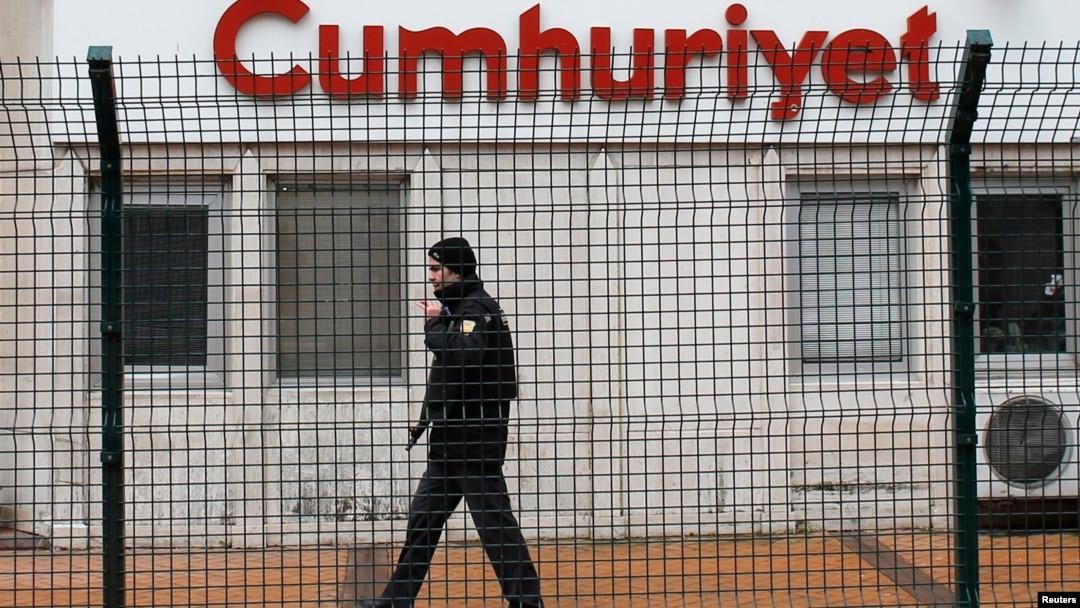Turkish prosecutors have launched an investigation into a national newspaper for publishing extracts from the latest edition of the French satirical magazine Charlie Hebdo. The investigation follows the Turkish prime minister condemning the magazine for publishing a cartoon depicting the Muslim Prophet Muhammad.
Prosecutors in Istanbul announced they are investigating Turkey’s Cumhurriyet newspaper for “inciting people to hatred or humiliation,” after it published the excerpts.
Cumhurriyet published four pages of the magazine as a special supplement, but it did not include the cartoon depicting Muhammad. Two columnists in the newspaper did include the cartoon in their columns and, according to local reports, they too are under investigation.
The probes follow Prime Minister Ahmet Davutoglu strongly condemning both publications. He said Turkey does not allow insults to Muhammad and that very clear, sharp and principled stance have been explained to press institutions.
Blasphemy
Depicting Muhammad is forbidden under the Islamic faith. A Turkish court has banned access to websites depicting the controversial Charlie Hebdo cartoon, while social media site Twitter has also taken down links to comply with the ruling. And, according to local media, the country’s national air-carrier Turkish Airlines has stopped distributing copies of Cumhurriyet.
Political scientist Cengiz Aktar of Istanbul’s Suleyman Sah University says, political tensions are rising over the issue.
"Some newspapers and the social media are calling for revenge. They are openly supporting the killers of the Charlie Hebdo team," Aktar explained. "They imply openly or covertly that those people who insult the prophet have no place in Turkey. But the government does not make moves to soothe things down. They have talked exactly the same way as the protesters. This is something worrisome."
While Turkey is a secular state, its population is overwhelming Muslim. The country is no stranger to religious disputes. Diplomatic columnist Semih Idiz of the Turkey’s Taraf newspaper and Al Monitor website, warns the latest controversy could turn violent.
"Well it is a highly controversial issue," noted Idiz. "It has the potential to drive people onto the streets and cause violence. It is nothing new for Turkey. In the past, we have staunchly secular writers, columnists, commentators and professors, who were murdered most people believe because of their secular and anti-Islamist views. Being, if one may say so, a crusader for secularism in Turkey has always been a dangerous thing."
Press freedom questioned
The controversy has again put the spotlight on press freedom in Turkey. The European parliament Thursday passed a motion strongly condemning Turkey over press freedom for recent police raids on media establishments.
Political scientist Aktar says the outcome of the Charlie Hebdo controversy is an important sign as to whether media freedom is being curtailed further in Turkey.
"This freedom of speech has been extremely badly treated by the government," Aktar said. "Jailed journalists, pressure on the editorial boards, fired journalists because the government did not like them, forbidden YouTube and Twitter occasionally. So the record is appalling. So in that sense it will be an important test for Turkey’s freedom of speech.
Turkish President Recep Tayyip Erdogan and the prime minister insist Turkey has some of the most liberal rules regarding press freedom. But observers say international pressure is growing on Turkey over this issue and the latest controversy over Charlie Hebdo is likely to only add to that pressure.


